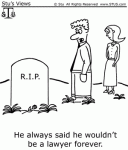 A New York appellate court has ruled that a lawyer’s death is no excuse for negligently allowing a client’s tort claim to prescribe. See Cabrera v. Collazo, 2014 NY Slip Op. 00622 (N.Y. App. Div. 1st Dept. Feb. 4, 2014). The lawyer died 11 days before the statute of limitations ran on his client’s medical malpractice claim. The aggrieved client sued his estate for legal malpractice. The defense argued that “neglect of a client matter by an attorney is not actionable if, as here, the attorney dies before the applicable limitations period runs against the client.” The court disagreed: “Plaintiff is entitled to the factual inference that, at this late juncture and mindful of his ill health, [the lawyer] was aware of the need to prepare and file a complaint or to arrange for one to be filed as soon as the necessary letters of administration were received. . . . [He] neither filed a complaint nor engaged another attorney to file one in his stead despite the availability of three attorneys associated with the firm as of counsel.”
A New York appellate court has ruled that a lawyer’s death is no excuse for negligently allowing a client’s tort claim to prescribe. See Cabrera v. Collazo, 2014 NY Slip Op. 00622 (N.Y. App. Div. 1st Dept. Feb. 4, 2014). The lawyer died 11 days before the statute of limitations ran on his client’s medical malpractice claim. The aggrieved client sued his estate for legal malpractice. The defense argued that “neglect of a client matter by an attorney is not actionable if, as here, the attorney dies before the applicable limitations period runs against the client.” The court disagreed: “Plaintiff is entitled to the factual inference that, at this late juncture and mindful of his ill health, [the lawyer] was aware of the need to prepare and file a complaint or to arrange for one to be filed as soon as the necessary letters of administration were received. . . . [He] neither filed a complaint nor engaged another attorney to file one in his stead despite the availability of three attorneys associated with the firm as of counsel.”
The takeaway? Don’t die, or at least don’t die with work to do. Better yet, have a plan for another lawyer to take over your practice after your death. The comments to ABA Model Rule 1.3 recommend just that:
[5] To prevent neglect of client matters in the event of a sole practitioner’s death or disability, the duty of diligence may require that each sole practitioner prepare a plan, in conformity with applicable rules, that designates another competent lawyer to review client files, notify each client of the lawyer’s death or disability, and determine whether there is a need for immediate protective action.
Good advice, even if there are (obviously) no disciplinary consequences for a deceased lawyer who fails to prepare such a succession plan in life.
